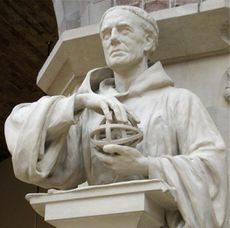Roger Bacon

Saint Germain was embodied in thirteenth-century England as Roger Bacon (c. 1214–1294). Reenter Merlin—scientist, philosopher, monk, alchemist and prophet—to forward his mission of laying the scientific moorings for the age of Aquarius his soul should one day sponsor.
Prophet of science
The atonement of this lifetime was to be the voice crying in the intellectual and scientific wilderness that was medieval Britain. In an era in which either theology or logic or both dictated the parameters of science, he promoted the experimental method, declared his belief that the world was round, and castigated the scholars and scientists of his day for their narrow-mindedness. Thus he is viewed as the forerunner of modern science.
But he was also a prophet of modern technology. Although it is unlikely he did experiments to determine the feasibility of the following inventions, he predicted the hot-air balloon, a flying machine, spectacles, the telescope, microscope, elevator, and mechanically propelled ships and carriages, and wrote of them as if he had actually seen them. Bacon was also the first Westerner to write down the exact directions for making gunpowder, but kept the formula a secret lest it be used to harm anyone. No wonder people thought he was a magician!

However, just as Saint Germain tells us today in his Studies in Alchemy that “miracles” are wrought by the precise application of universal laws, so Roger Bacon meant his prophecies to demonstrate that flying machines and magical apparatus were products of the employment of natural law which men would figure out in time.
From whence did Bacon believe he derived his amazing awareness? “True knowledge stems not from the authority of others, nor from a blind allegiance to antiquated dogmas,” he said. Two of his biographers write that he believed knowledge “is a highly personal experience—a light that is communicated only to the innermost privacy of the individual through the impartial channels of all knowledge and of all thought.”[1]
And so Bacon, who had been a lecturer at Oxford and the University of Paris, determined to separate himself and his thoughts from the posing and postulating residents of academe. He would seek and find his science in his religion. Entering the Franciscan Order of Friars Minor, he said, “I will conduct my experiments on the magnetic forces of the lodestone at the selfsame shrine where my fellow-scientist, St. Francis, performed his experiments on the magnetic forces of love.”[2]
Persecution
But the friar’s scientific and philosophical world view, his bold attacks on the theologians of his day, and his study of alchemy, astrology and magic led to charges of “heresies and novelties,” for which he was imprisoned in 1278 by his fellow Franciscans! They kept him in solitary confinement for fourteen years,[3] releasing him only shortly before his death. Although the clock of this life was run out, his body broken, he knew that his efforts would not be without impact on the future.
Roger Bacon and astrology
Bacon was a vigorous proponent of astrology. In his day, the words mathematician and astronomer were interchangeable with astrologer. Although astrology flourished in the Middle Ages inside and outside the Church (several popes had court astrologers), it had earlier been condemned by the Church Fathers.
In his Opus Majus Bacon argues that the Church Fathers did not denounce astrology as a whole but rather the fatalism of some practitioners. According to Bacon, the problem exists in “lying or fraudulent mathematicians, full of superstition,” who “imagine that necessity is placed upon those things in which there is choice, and particularly in matters which proceed from free will.”[4] In other words, those who claim that astrology is predestination are misusing it.
He says that on the other hand “true mathematicians and astronomers or astrologers, who are philosophers, do not assert a necessity and an infallible judgment in matters contingent on the future.”[5]
Legacy
The following prophecy which he gave his students shows the grand and revolutionary ideals of the indomitable spirit of this living flame of freedom—the immortal spokesman for our scientific, religious and political liberties:
I believe that humanity shall accept as an axiom for its conduct the principle for which I have laid down my life—the right to investigate. It is the credo of free men—this opportunity to try, this privilege to err, this courage to experiment anew. We scientists of the human spirit shall experiment, experiment, ever experiment. Through centuries of trial and error, through agonies of research ... let us experiment with laws and customs, with money systems and governments, until we chart the one true course—until we find the majesty of our proper orbit as the planets above have found theirs.... And then at last we shall move all together in the harmony of our spheres under the great impulse of a single creation—one unity, one system, one design.[6]
See also
Sources
Mark L. Prophet and Elizabeth Clare Prophet, Lords of the Seven Rays
Elizabeth Clare Prophet, The Astrology of the Four Horsemen
- ↑ Henry Thomas and Dana Lee Thomas, Living Biographies of Great Scientists (Garden City, N.Y.: Nelson Doubleday, 1941), p. 15.
- ↑ Ibid., p. 16.
- ↑ Ibid., p. 17; David Wallechinsky, Amy Wallace, and Irving Wallace, The Book of Predictions (New York: William Morrow and Co., 1980), p. 346.
- ↑ The Opus Majus of Roger Bacon, trans. Robert Belle Burke, vol. 1 (Philadelphia: University of Pennsylvania Press, 1928), p. 268.
- ↑ Ibid.
- ↑ Thomas, Living Biographies, p. 20.
